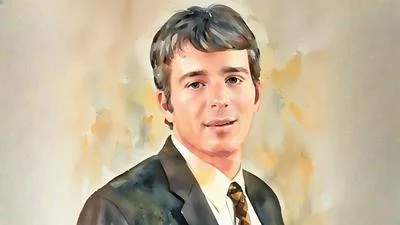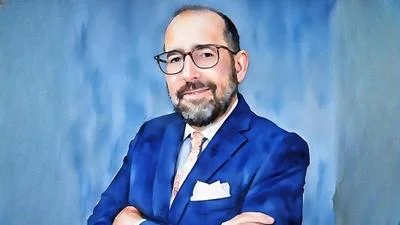Maureen Tusty is co-owner and creative director of Sky Films Inc. She has directed and produced documentaries including She Rises Up, The Singing Revolution, Trailblazers: The New Zealand Story, and Sweden Lessons for America.
This transcript has been edited for length and clarity.
Federal Newswire: What led you to make your latest film, “She Rises Up”?
Tusty: I gravitate towards real stories of real people. I worked on some fictional projects, but they just didn't resonate for me. I love hearing things firsthand from the people who are living it, whether that was doing corporate work, educational work, or now documentaries, [which has been our focus for the last 15 years]. We tend to film overseas and bring lesser-known stories back to the U.S. to share here.
People say it so much better in their own words. In this film, one of the things we're most excited about is that we don't have content experts. We don't have a narrator. It is just the women telling you about where they've come from, what they're working on, and we follow along as they're trying to make change in their communities.
Federal Newswire: Was the idea to highlight entrepreneurial women?
Tusty: One of the underlying takeaways from the film is that innovators are everywhere. Entrepreneurs are everywhere. They [have], no matter how poor the country, that spirit. That is human nature. We want to trade. We want to make things happen. We want to take care of each other. That happens through interaction.
The women in these films [have] very different motivations, but they're using their businesses to create jobs. Primarily for women, the obstacles that hold entrepreneurs back make it so hard to actually run a business in some of these regions of the world. [It’s] just exponentially harder for women to break out in those cultures.
Federal Newswire: How did you find the women?
Tusty: We did a lot of research. We talked to people on the ground, and probably in over a dozen different countries, and we were exploring how to hone this story. We kind of knew what the think tanks, the nonprofits, and the groups working there [were saying]. The same messages kept coming up. It's the lack of jobs. It's not necessarily a lack of education. People are graduating from school, they're getting out, and there's no place to work there.
That's why they get on a boat and take these risky chances of going across the sea. They join a caravan. They're desperately seeking work to take care of their family. People don't want to leave their homes. We just kept hearing this again and again. We wanted to talk about that, and the [other] barriers.
One third of the countries in the world have some form of legal barrier for women participating, and it's often under the premise of protecting them. But, it's limiting access to bank accounts. You can't work after 7 p.m. because it's dangerous. Well, a lot of women don't have childcare during the day. They have it in the evening. So, it just restricts their ability to get out and do it for themselves. Or needing to cosign with your husband if you want a loan.
A lot of places are slowly improving, but then it needs to sink into the fabric of the culture. One third of these countries have these laws. The poorest countries in the world still have these very oppressive restrictions for women. That trickles out into the whole business environment in these locations.
Federal Newswire: What is a good example from your movie?
Tusty: Property rights is a great example. De Soto's work has focused on that. We even saw that in Peru. So, I think part of what we [see is] how much someone like Maggate [a subject of the movie] struggles in Senegal with all of the excessive regulation, and excessive controls on how she can hire and fire people.
Then, you get into Peru where the poverty level is not as extreme, as in Senegal. I think one of the things to get across is that a few reforms really can have an impact. You look at the corruption at the highest level and say how is this ever going to change? How are people ever going to trust [enough] to want to formalize their businesses or put the effort into what it takes to gain their property rights?
Gladys [another subject of the movie] … runs a mini market. For years, she built it up. She comes from the most extreme poverty, and a very challenging family situation in the Andes Mountains. She made her way as a teenager to Peru. She built up this mini market from the ground up completely on her own, because it was so important for her to have her own income and not be dependent on a man.
She has a great husband, but he's much more cautious than she is, and she wanted to expand. She went out and got the loan on her own, and it's all in her name. She's now expanding and we followed her through that process. [Through] the experience of formalizing her business, she's discovering [that she is] actually contributing to her country.
Federal Newswire: Do you see the ‘entrepreneurs’ dream’ as transformative?
Tusty: It is. I think people come here because of the ease of starting a business here. Someone gave me this phrase, “the presumption of liberty” that we have here. Certainly there are groups working on better regulations in some states that may have a better business environment than other states, and that matters.
You see the flow of businesses in and out of states. There's certainly regulations here that people can talk about, but it's nothing compared to what the poorest countries deal with [or] the oppressive environment that these entrepreneurs have to fight against. But if they could create an environment like we have here in the US, they would absolutely be living the Senegalese dream. They'd be living the Sri Lankan dream.
Federal Newswire: Are these stories emblematic of the marks that trade and colonization leave on civilizations?
Tusty: Absolutely. I always get a little hesitant at these longer conversations because I am not an economist. I think that's why we try to humanize this, because we sit here and talk about trade. It's also what allows communities to thrive, even from the most basic, “I can grow this, you can grow that,” or “I have this skill, you have that skill.” It is human instinct for survival and for growth.
Federal Newswire: Having made documentary films over the last several years, are there common themes that come up?
Tusty: It's funny, since we started Sky Films 15 years ago, we've done about eight different documentaries, some of them theatrical or for public television. But, we do have this theme of human freedom–whether that's political freedom, economic freedom, or personal freedom.
We go out, we find people are living it in regions of the world where it's really had an impact, and it is what has allowed a billion people to come out of poverty since the 1990s. In the past 25 years, progress has been made.
The work's not done yet and poverty is there. So, we're trying to bring the focus back to women in particular, and what financial independence will mean for women in particular in these regions. Until that is addressed, you aren't really going to have an end to poverty. So that's the intersection of entrepreneurship, women's financial independence, and the impact on poverty, and that's what we try to weave together through these women who are living it.
Federal Newswire: What is the Singing Revolution and how did it come about?
Tusty: That one has a very special place in our hearts. My husband's father is an Estonian immigrant. He doesn't speak Estonian. He didn't grow up knowing it. We had the opportunity to teach a filmmaking course in one of the first universities after Estonia regained its independence, and it was there that we started.
People started telling us stories about what happened during the 50 years of Soviet occupation, but also about the cinema revolution. They would talk about what it meant for them to be at these festivals, [which] grew to 500,000 people in this tiny country of 1.4 million. They would all come out to these massive song festivals and singing protests.
You see also how much song was a way they maintained their culture. When they would have this festival every five years, the Soviets tried to co-opt that and certain Estonian songs were forbidden. [They] could only sing very pro-Soviet songs, but then there would be these moments, even in the 60s and then later in the 80s, where they would spontaneously [have] 30,000 people on stage, 100,000 people in the audience.
Everyone is singing these traditional songs, and they all know them. They all are singing in perfect harmony. These songs, as well as the culture, have been kept in the home, and it was very strategic. Estonia is one of the strongest, most thriving countries in the EU today. It's amazing what they have achieved since then.
Federal Newswire: What is the draw of the simple storytelling of documentary films?
Tusty: [You can’t] get into all too many facts and data and overwhelm people. It humanizes the story. Suddenly you're seeing this person who's actually living the experience, or sharing what the experience was. It allows you to absorb the message, but it also allows you to absorb the experience.
Federal Newswire: Where can people see “She Rises Up”?
Tusty: After the theatrical release it will be hitting all the universities. We've received a tremendous response so far. This film will be seen in many universities across the country, and then it will continue on the distribution path.
Federal Newswire: How can we find out more about your work?
Tusty: Sherisesupfilm.com or SkyfilmsInc.com is our company. You can also find the film on Facebook and social media. We get asked very often, “so what can we do from here?”
That leads to great conversations–it's not about foreign aid. It's been shown that is not impacting poverty. Think of this: Senegal has a tremendous leather industry and shoemakers. Sending shoes doesn't really help them. It's hurting their business. Think of it in terms of what you can buy from Africa. What can you buy from a businessperson in Latin America?
We have to then take it to the next step and look at a healthy business environment that allows real growth to happen. Real growth means ending poverty. Real growth means people enjoying the prosperity that we have here, and they don't have to leave their home. Folks find it.









